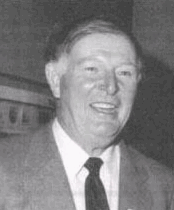|
Viewpoint-11 January 2005 |
|
Harry Robinson Asks: Who to Woo -- Pollies or Public? |
 Remember
Doug Anthony? He of the blonde hair, cheeky grin and the title of Deputy Prime
Minister? He who gave the Nationals a human and humour-filled face? Out of
politics for years now, Doug still manages to hit a policy nail on the head.
Remember
Doug Anthony? He of the blonde hair, cheeky grin and the title of Deputy Prime
Minister? He who gave the Nationals a human and humour-filled face? Out of
politics for years now, Doug still manages to hit a policy nail on the head.
In Townsville, Robin Williams of the ABC Science Show, hosted a symposium on the
future of the Reef, recorded and later played on Radio National. Science had
sent in her big guns who were, truth to tell, so unified in their views on
corals, global warming and farm run-off that they began to sound boring.
Williams, a dab hand at timing, called in Doug Anthony. The voice was older,
less sure than we would remember it but it carried the good sense of earlier
times. He addressed the issue that the others had been playing with -- the
seeming impossibility of getting politicians to take the environment seriously
and to bring about long term change.
Yes, said Doug, politicians can seem immovable, change can seem to be a distant
dream. But it could happen and quite quickly if the general public wanted it. He
recalled the time before the 70s when Joh Bjelke-Petersen wanted to allow
drilling for oil on the Reef. The people at large were so alarmed that they
swamped Canberra with telegrams (no e-mails then), letters, petitions and
telephone calls and prompted the federal government to step in and stop the
drilling idea dead in its tracks.
The Hon Doug (I suppose a former Deputy PM is still an Honourable) went on to
recall public disquiet over sand mining on Fraser Island -- disquiet that also
raised protests galore. The federal government put the kybosh on Fraser Island
sand mining.
Changes were wrought, he said, when the public showed that they wanted action.
He became a tad diffident for a moment but went on to say that small groups of
people -- meaning 200 or so scientists -- could not effect political change. It
was good that they met and thrashed out their issues, but nothing would happen
without impetus from the general public.
He spoke for perhaps two minutes. His contribution was pertinent. His advice
could be summed up this way: If you want to move a government, don't bother
nagging politicians -- get a pack of the public behind you. The rest will
follow.
Good advice but too simple by half. The two examples in the Anthony speech --
The Barrier Reef and Fraser Island -- were tangible targets, well known national
treasures which voters could see in their minds. The demand on government was
also simple: Stop the drilling/sandmining. Nothing subtle, nothing ambiguous, no
devil in the detail.
By contrast, the educational and scientific community want from government
something that nobody can visualise. They want money for higher education and
adventurous research. So far as the ordinary voter is concerned, the edu/sci
people are talking about wisps of mist. It's hard for Joe and Jean Blow to get
excited about wisps.
The challenge to which Doug Anthony pointed is to devise ways of creating
desirable profiles of teachers and researchers in the public mind -- Australian
Idols of the tutorial room and the laboratory. If that sounds facetious, so be
it, but that way could success lie.
Meanwhile, one way to outflank the treasurer is to forget about grants and
budget funds and to promote the idea of increasing rates of tax deductions for R
& D. Commercial research and development would suddenly become more tempting,
activity would increase. The treasurer would know, of course, that his
concessions would eventually come out of consolidated revenue. But not
immediately and not as a giveaway. Companies would have to do the work and spend
the money before they could claim the increased deductions. A treasurer could
live with that.
While on the matter of treasure, Peter Costello released his mid-year review of
national money flows a few days before Christmas when everyone was too busy to
take notice. It did register, though, that Mr Costello had piled up a extra
billion $s in the surplus kitty to make a total of $6 billion for the financial
year. He did not say what he would do with the moola but allowed us to guess
that he would pay down the national debt a little further. He let on that
Australia's national debt was now around 3% of GDP, a mere speck in the ledgers.
While there's work to be done on the environment, in universities, in
laboratories, in libraries, it seems strange to devote a surplus to tidying up
the books.
Harry Robinson -- for 25 years worked in television journalism in Oz and the US and was for several years air media critic for the Sydney Morning Herald and the Sun-Herald.